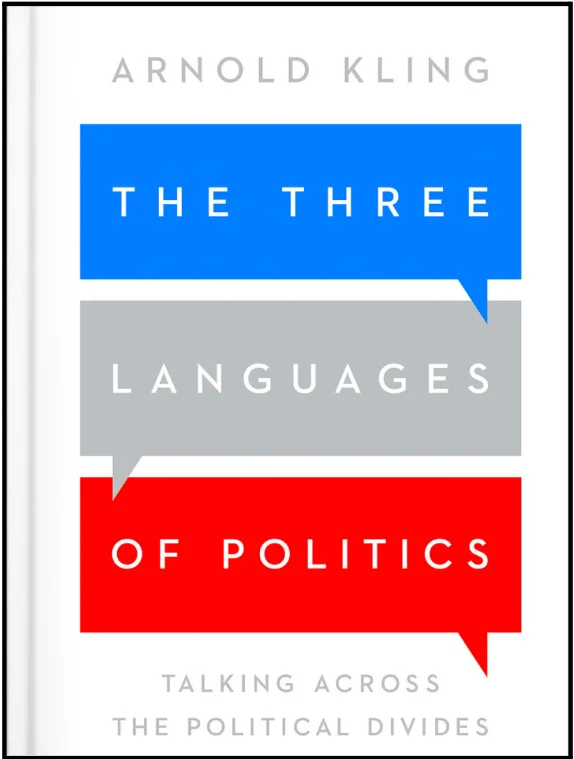Talking Big Ideas.
Nico Perrino recently interviewed me on So to Speak: The Free Speech Podcast. Nico is the Executive Vice President of the Foundation for Individual Rights and Expression (FIRE).
Our full conversation is available online as audio, video, and transcript. Below is a slightly edited segment from our discussion. We focus on the importance of speaking the language of your audience.
I encourage you to check out the fantastic work Nico and his colleagues are doing at FIRE.
***
NICO: I want to get started and talk about audience. How do you work with your clients to help identify their audiences? So that they’re not just talking to the masses, so to speak?
BOB: At the highest level, communication is about connection. The better we understand our audiences the more effectively we can connect with them. We always encourage our clients to begin by answering these questions:
Who is your audience?
What are they interested in?
How can you help them?
This is a good starting point, whether it’s for a keynote presentation, a testimony before Congress, or a conversation that you’re having in line at the grocery store.
NICO: It’s more work to figure out how you can make your message resonate with a particular audience. It’s a lot easier to just blast your message out without any sort of thought or strategy.
BOB: There’s a classic quote from the tech writer Ken Haemer. He says, “Giving a speech without an audience in mind is like writing a love letter and addressing it to whom it may concern.”
NICO: That’s brilliant and exactly right. You can understand intuitively that writing a love letter to no one in particular is not going to be effective. But we don’t think about it in the same way when we’re doing public interest litigation, or advocating in the court of public opinion for Constitutional Rights.
BOB: Maryrose and I were with my mom recently in Tuscany, an absolutely gorgeous vacation. We don’t speak Italian and some of the people we met didn’t speak English. It really drove home that people speak different languages and made me think about Arnold Kling’s fantastic book, The Three Languages of Politics, and just how important speaking the right language is to be able to understand other people.

Kling says that we have three – and he’s updated it to say four – different languages that we’re speaking right now in the United States when it comes to politics. And if you only speak your own language, and don’t understand the others, you’re going to have a hard time connecting with anyone outside your tribe.
To be effective communicators, we need to learn how to understand and speak the languages of our audiences.
The four different languages Kling identifies are progressivism, conservativism, libertarianism, and populism. Each language operates on a different axis. Progressives tend to use an oppressed-oppressor axis. Which is often the context through which they’re seeing the world and how they’re understanding and talking about issues and ideas.
Conservatives have a different axis: civilization versus barbarism. For libertarians, it’s liberty versus tyranny. And now with the rise of populism, there’s a growing amount of people thinking in terms of nationalism versus globalism.
If we want to effectively connect with people, we have to understand and be able to speak their language. And tailor our communication to our specific audiences. We have to address the love letter correctly, so to speak.
NICO: That’s really smart. Jonathan Haidt discusses in The Righteous Mind the need to appeal to people’s moral intuitions.
BOB: Yes, exactly. Another big idea here is the difference between System 1 and System 2 thinking, from Dan Kahneman’s iconic book.
NICO: Let’s break that down.
BOB: Dan Kahneman, a brilliant thinker – the first non-economist to win the Nobel Prize in economics – wrote Thinking, Fast and Slow and Noise, which are deep books that we should read and understand.
In Thinking, Fast and Slow, he breaks down two different types of thinking. He calls them System 1 and System 2. System 1 is quick and intuitive and we use it all the time. The tiger jumps out at us and we run away, or something happens and we need to quickly respond. Then, we have this other type of thinking which is slow and deliberative. He calls it System 2.
This ties in with one of the core insights from the book you just mentioned, The Righteous Mind, where Haidt says his first principle of social psychology is that intuitions come first and reasoning follows. Haidt is saying that we make quick System 1 judgments all the time. And then we use our System 2 thinking to come up with ways to justify these snap judgments and intuitions.
Most of the time when we’re interacting with people, we’re engaged in quick System 1 thinking. We’re making judgments and intuitions that are biased based on the language we speak. And perhaps getting angry and feeling self-righteous with people that speak a different language.
Importantly we’re not confined to only using our System 2 thinking to justify our biased intuitions. We can break free. As Arnold Kling says, we don’t have to use our System 2 brain to be a lawyer that’s only able to justify our biases. We can use our slow, deliberative thoughts to be like a judge that’s honestly trying to seek the truth.
We each have the capacity to use our System 2 thinking to better understand the world – and move beyond anger and partisan ideology to meaningfully connect with people.
For the full conversation, check out the audio, video, or transcript.



